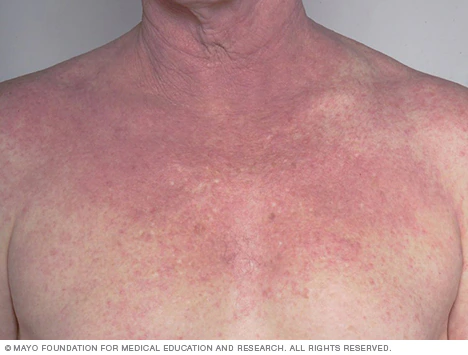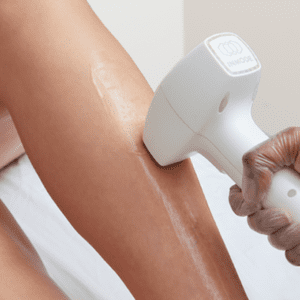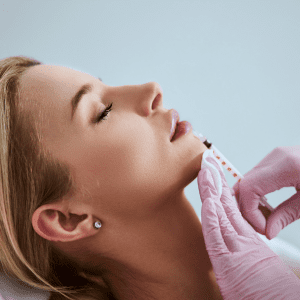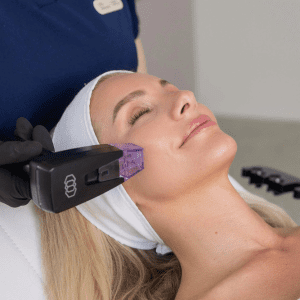
ATOPIC DERMATITIS
The treatment plan for this persistent skin condition uses personalised dermatological approaches.
The symptoms of atopic dermatitis (AD) include dry, itchy, irritated skin that represents a chronic recurrent form of eczema. The disorder, which mainly appears in newborns, children, and young people, produces two problems with daily living and sleep quality because of its symptoms that include continuous itching and visible skin changes. The medical condition develops because of hereditary and environmental factors, which often leads to its inclusion in the “atopic triad” together with asthma and allergic rhinitis (hay fever).
Atopic dermatitis patients at Rasa Derm receive specific and caring treatment focusing on skin barrier restoration alongside trigger management and extended relief measures.
Atopic Dermatitis: What Causes It
AD develops through the combination of malfunctioning immune systems and inherited genetic factors:
- Skin Barrier Defect: A skin barrier defect occurs because natural skin oils and protective proteins are absent, leading to dryness along with increased water loss and higher sensitivity to allergens and irritants.
- Immune Overactivity: The immune system produces persistent inflammation and itching because it overreacts to ordinary stimuli.
- Genetics: Risk is increased by a family history of allergies, asthma, or eczema.
- Environmental Triggers: Sweat, heat, dust mites, wool, soaps, and detergents can exacerbate symptoms.
- Skin that is thick, scaly, or dry
- The skin areas of the cheeks, neck, elbows, and below the knees and wrists display red or brown spots.
- Excruciating itching, particularly at night.
- The affected area shows crusting or oozing or bleeding during flare-ups.
- Recurring skin scratching causes lichenification, which leads to skin darkening.
- Heightened awareness of scents, soaps, or climate shifts.
- Red, teary rashes on the face, scalp, and limbs in infants
- Children: Swollen areas behind the neck, elbows, or knees.
- Adults:Eyelid dermatitis, face flare-ups, or persistent hand eczema.
Consult a specialist at Rasa Derm if :
- You or your child experience frequent flare-ups despite moisturization.
- The itching affects sleep or daily activities.
- There are signs of infection like yellow crusting, pus, or fever.
- Symptoms worsen with weather changes or stress.
You’re concerned about long-term steroid use and want safer alternatives.
The treatment plan at Rasa Derm uses medical solutions together with behavioural adjustments and continuous patient education to let people gain better control of their skin.
1. Topical Treatments
- Topical Corticosteroids: Reduce inflammation and itching during active flare-ups.
- Calcineurin Inhibitors (Tacrolimus, Pimecrolimus): The topical treatments tacrolimus and pimecrolimus belong to the calcineurin inhibitor class and function as non-steroidal solutions for sensitive facial areas, including eyelids.
- Barrier Repair Creams: Restore skin’s natural defences and reduce dependency on steroids.
- We suggest patients apply multiple times daily different moisturisers that contain ceramides and no fragrances.
- The application of bath oils together with lipid-replenishing cleansers helps maintain skin moisture levels.
- Antihistamines: The medication of antihistamines helps patients manage their nighttime itching and enables better sleep quality.
- Oral Immunomodulators (like cyclosporine or azathioprine): The treatment of moderate-to-severe cases involves using oral immunomodulators, which include cyclosporine and azathioprine, because topical treatments prove inadequate.
- Antibiotics or antivirals: Antibiotics or antivirals: Prescribed in cases of secondary skin infections.
4. NB-UVB Phototherapy
- Narrowband UVB therapy delivers dual benefits by decreasing inflammation and eliminating itching for patients with moderate to severe eczema.
- A non-invasive treatment with safety features that patients can use for long-term control under doctor supervision.
5. Flare-up Prevention & Lifestyle Coaching
- Education on trigger avoidance, bathing techniques, and clothing choices.
- The management of stress receives counselling because psychological stress often intensifies symptoms.
- The development of individualised skincare regimens that consider patient-specific factors, including their environment and age group.
Why Choose Rasa Derm For Atopic Dermatitis Management
- Dr. Veenu Jindal provides expert care for paediatric and adult eczema patients at Rasa Derm.
- Steroid-reducing treatment methods form part of our approach to achieve sustainable skin wellness.
- Patient-first philosophy with custom treatment plans and hands-on support.
- Use of advanced therapies like NB-UVB and non-steroidal topicals.
- Dedicated care for skin of colour, infants, and sensitive skin zones.
Everyday Tips to Manage Atopic Dermatitis
- Bathe in lukewarm water, not hot.
- Use gentle, soap-free cleansers.
- Pat skin dry and apply moisturiser within 3 minutes of bathing.
- Wear soft, breathable cotton fabrics.
- Short nails should be kept since scratching with long nails causes skin damage.
- Identify and avoid personal flare triggers (sweat, dust, fragrances, etc.).








